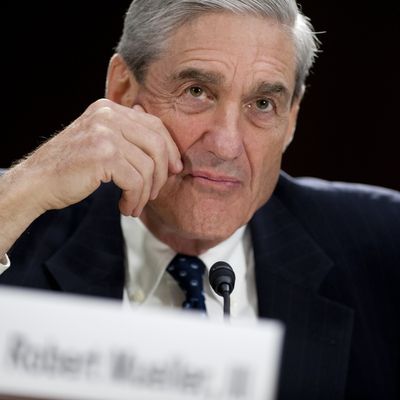
The announcement on Friday that 12 Russian intelligence figures were were being indicted for allegedly meddling in the 2016 U.S. election appeared to put President Trump in an awkward position, but it also provided an easy line of attack for his allies. Why was Mueller — the man Democrats would have you believe is a longtime Republican carrying out his investigation quietly and apolitically — releasing this information just three days before Trump’s meeting with Putin?
Deputy Attorney General Rod Rosenstein, who oversees the Mueller probe, insisted on Friday that the timing was “a function of the collection of the facts, the evidence, and the law and a determination that it was sufficient to present the indictment at this time.” But many found that unconvincing.
“It’s a big ‘eff you’ from Mueller,” one White House official groused to Politico, speculating that the pre-summit release by Mueller “wasn’t an accident.”
On Fox News, Trump’s pal Sean Hannity deemed Mueller’s timing “suspect.”
The Russian Foreign Ministry used the same angle in its response, saying, “The goal of this ‘information attack’ is obviously to spoil the atmosphere prior to the Russian-American summit.”
Now it looks like those complaining about the timing should have checked with Trump first. On Tuesday night Bloomberg reported that the president wanted the indictments to be released before the summit:
President Donald Trump gave the go-ahead to announce new Russian election-hacking indictments before his meeting with Vladimir Putin rather than after — in the hopes it would strengthen his hand in the talks, according to accounts from people familiar with the decision.
In the hours after Trump’s disastrous summit with Putin, White House officials gave the Washington Post conflicting accounts of Trump’s take on the indictments. One officials said Trump spent the weekend “growling” about the possibility that they would hurt him politically, while another said he was in favor of the release because he wanted to discuss the matter with Putin privately. The report suggested Trump had been prepped to take a tough posture toward the Russian leader, then decided to go rogue at the summit.
Bloomberg was the first to report that Trump actually had a say in when Mueller’s latest findings would come out (though presumably, never wasn’t an option):
Deputy Attorney General Rod Rosenstein went to Trump last week and offered him the choice: before or after the Putin summit on Monday in Helsinki? Trump chose before, ultimately putting the issue into the spotlight just 72 hours before the high-stakes meeting, the people said.
CNN reported that Rosenstein briefed Trump on July 9, before he departed for his European trip, and while the timing was discussed, they made no decisions. “After consultations between Trump and top White House officials, the White House later told Justice not to hold off in announcing the indictment,” CNN said.
While the point was overshadowed by the substance of the indictments (and Trump lobbing attacks at the British prime minister during his U.K. trip), Rosenstein said during Friday’s press conference that he’d briefed Trump earlier in the week, and “the president is fully aware of the department’s actions.”
Bloomberg said Rosenstein “invoked an exception on national security grounds” that allowed him to brief Trump about ongoing grand jury proceedings in an investigation involving his campaign.
“Obviously, it was important for the president to know what information we’ve uncovered because he’s got to make very important decisions for the country. So, he needs to understand what evidence we have for election interference,” Rosenstein said on Friday.
When asked if Trump supported releasing the indictments, Rosenstein replied, “I’ll let the president speak for himself.”
Of course, Trump never got around to clarifying that Mueller didn’t sneak attack him in a shameless, partisan effort to derail his summit with Putin.






























